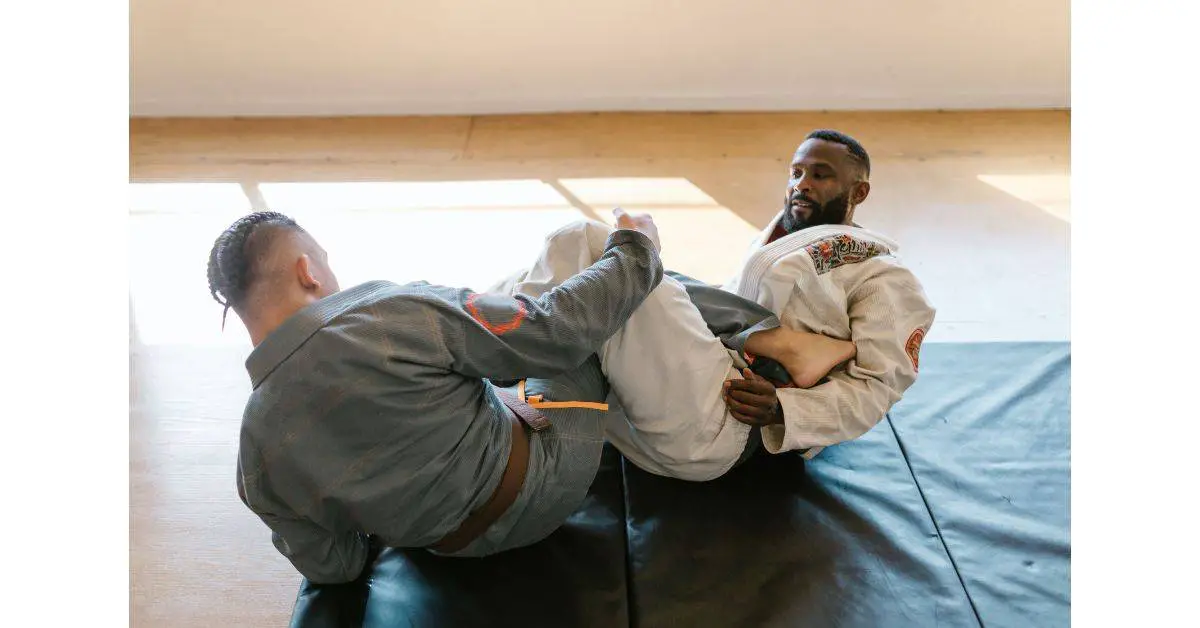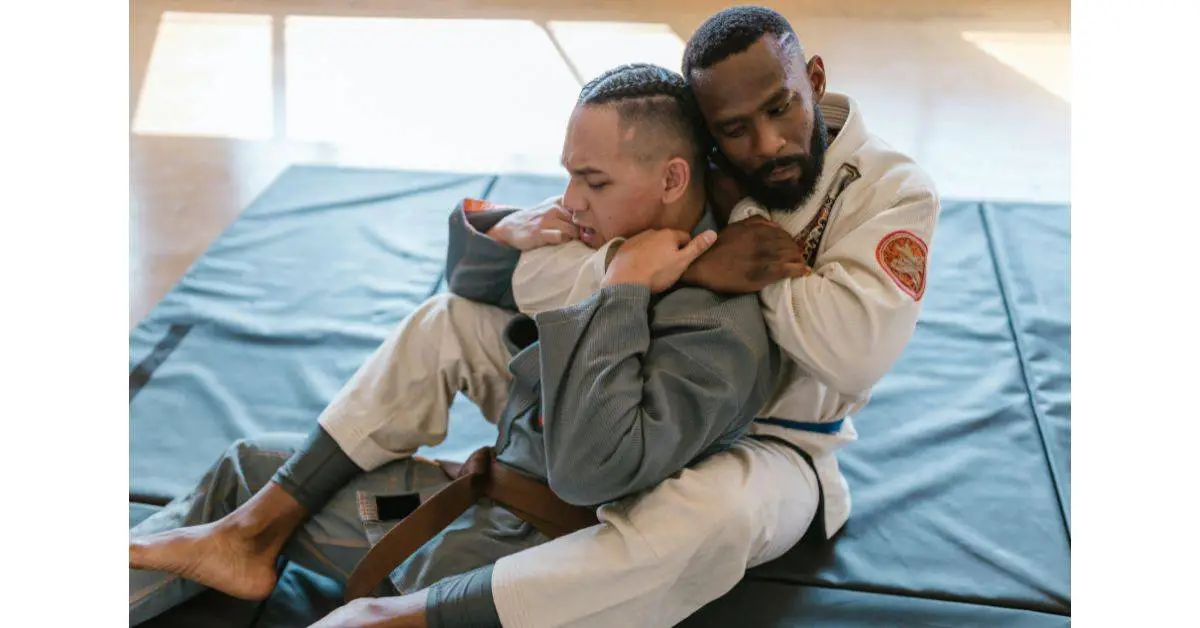BJJ, or Brazilian Jiu-Jitsu, is one of the most effective martial arts ever created. Its initial purpose, is of course, to teach others self-defense. Because of that, its original teachings are going to be suitable for that purpose. So, let’s examine whether BJJ is effective for self-defense.
Brazilian Jiu-Jitsu is effective for self-defense because it teaches ground grappling, a highly effective group of fighting techniques. Moreover, it teaches its trainees numerous ways to both defend and attack their opponents. In fact, it’s not uncommon to see a fight end with a single execution of a grappling technique.
Because using ground grappling is so effective, many MMA fighters use it as their primary martial art. Mostly, these fighters are able to achieve elite levels of achievements and skill level.
So, as a result, you’ll see many people using Brazilian Jiu-Jitsu as their primary martial art in the elite l evels of fighting.
But, we’re not here to talk about MMA and the UFC. Instead, we’re here to discuss self-defense. So, let’s do just that.

Before diving into the article, I highly recommend following the link to read about the best grappling mats for your money. Such a purchase is a must if you want to study BJJ at home.
Is BJJ good for self-defense?
Today, many people want to learn how to defend themselves. Consequently, they take rushed classes on how to disable an attacker in less than a second. However, these rushes classes won’t teach you that as well as real martial arts, which purpose is to teach others how to fight.
Brazilian Jiu-Jitsu, or BJJ, is good for self-defense because it teaches how to attack and defend yourself using grappling movements, which are practical and effective. As a result, it’s not as uncommon to see BJJ trainees finish fights with a single submission or a choke in self-defense situations.
The primary aspect of BJJ that makes it so good for self-defense is the fact that it teaches ground grappling. Yes, that’s it.
Ground grappling, if you don’t know, is various techniques that allow you to submit/choke your opponent. These techniques are highly effective because a single one of these can finish a fight.
For example, let’s take the Triangle Choke, one of the more common grappling movements. In fact, many people who don’t partake in martial arts—know how it looks.
The Triangle Choke is effective because there’s no running from it. The trainee uses his body parts to ensure the opponent can’t escape from the move, even if one is bigger physically.
Have a look at how the Triangle Choke is played out!
As you can see, if you were to use it in a self-defense scenario, you would immediately be victorious if you land it appropriately. Literally, there’s no possible way the opponent escapes if you know what you’re doing.
Is BJJ effective for street fights?
Street fights and self-defense are closely related. In fact, the first is an example of the latter. Hence, some self-defense situations will be street fights. So, let’s examine whether BJJ is suitable for street fights.
BJJ is effective for street fights because it teaches practical techniques to finish a fight swiftly. Primarily, it teaches ground grappling, which a single execution of—can disable the opponent. As a result, if a BJJ trainee uses ground grappling in a street fight, he instantly has the advantage.
Street fights and self-defense are essentially the same. The only difference is that self-defense is a much broader group of possible scenarios. Nonetheless, street fights often refer to a situation where you face an opponent in a one-on-one scenario.

Thus, your fighting skills will come into play if you partake in a street fight. Well, what better way is there to hone your fighting skills if not with martial arts? Their purpose is to teach others self-defense.
So, if you study BJJ, even not as much, you’ll be improving your fighting capabilities. Therefore, you’ll increase your likelihood of winning street fights, if you ever decide to participate in one.
Before moving on, if BJJ classes seem too expensive for you, and you’re unwilling to spend as much money on them, I’ve got just what you need. I wrote an article on the best ways to train Brazilian Jiu-Jitsu at home—and I encourage you to read it, even if currently attend classes.
Is BJJ effective?
All martial arts provide some value, even if it’s not as prominent as other fighting styles. Because of that, before you choose which martial art you’ll learn, it’ll be best if you consider what they teach. Then, you’ll be able to compare it with your desires. So, is BJJ effective?
Brazilian Jiu-Jitsu is effective because it teaches ground grappling techniques, which are practical and can cause massive damage quickly. Additionally, many elite UFC fighters, who can use any martial art they desire—use BJJ as their primary martial art, since it’s that effective.
Take a look at the following video if you want to see BJJ moves bringing results in real time.
Eventually, ground grappling is what will help you win more fights, both in self-defense and competitions. Most people know how to dodge a punch. However, few of them are familiar with complicated defensive guard positions.
BJJ trainees’ tool box is much larger than those who, for example, who do boxing. As a result, they’ll be much more dynamic.
After all, no one can withstand the pain of a triangle choke until one passes out. However, some people know how to take a hit to the face without moving an inch. But, if you land a grappling technique, you’ll win – regardless of your opponent’s size.
Additionally, BJJ provides other benefits; here’s a study that showcases it perfectly:
Results revealed participants reported a broad variety of benefits arising from their participation in BJJ. Personal benefits were self-confidence, analytical thinking, perseverance, stress relief, and physical health. Social benefits were respect and tolerance for others and community environment.
SOURCE
What does BJJ teach?
Every martial art teaches its own thing. However, many of them, more often than not, have similar fighting techniques they teach their trainees. For example, boxing and karate both use similar punching techniques, the hook and the straight punch.
Well then, what does BJJ teach?
Brazilian Jiu-Jitsu is the art of ground grappling, which is a group of techniques that involve forcing the opponent to submit through pain or a choke. For example, the rear naked choke is a fantastic example of a choke that can finish a fight in a matter of seconds. Escaping from it—really isn’t an option.
Some other techniques BJJ teaches include:
- Triangle choke
- Rear naked choke
- Paper cutter
- Gogoplata
- Guillotine choke
- Peruvian choke
And, of course, this list showcases some of the techniques it teaches. Nevertheless, it teaches plenty of other chokes and submissions – which, if you use correctly, will lead to your opponent being unable to escape—regardless of his strength or will power.
Some Jiu-Jitsu styles also teach takedowns, kicks, and striking. However, BJJ, specifically—does not. Instead, it solely focuses on ground grappling techniques, which are, again, chokes and submissions executed on the ground.
Final words
I love BJJ because of the positive impact it had on so many lives. A part of this website is to make more people do martial arts, since they provide countless physical and mental benefits.
BJJ teaches practical, valuable, and effective fighting techniques. As a result, this martial art is suitable for self-defense and all other fighting scenarios. That is why many UFC and MMA fighters use Brazilian Jiu-Jitsu as their primary martial arts; it simply gets results.
If you enjoyed reading this article, I recommend reading an article I wrote about the best BJJ fighters from around the world. It’ll give you another perspective on what makes this martial art such a unique and effective fighting style.

